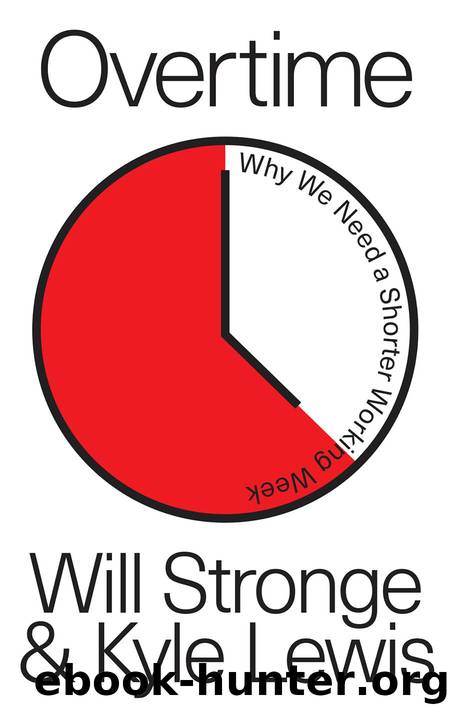Overtime: Why We Need a Shorter Working Week by Will Stronge & Kyle Lewis

Author:Will Stronge & Kyle Lewis [Stronge, Will & Lewis, Kyle]
Language: eng
Format: epub
ISBN: 9781788738682
Google: 2-M9EAAAQBAJ
Publisher: Verso Books
Published: 2021-01-19T23:28:08.776359+00:00
A transition to degrowth must involve abandoning GDP (Gross Domestic Product) as a measure of success for an economy, and fundamentally recalibrating what we value. In short: change the metrics. Rather than viewing perpetual growth as an end in itself, a sustainable degrowth approach would implement measurements that are geared towards, and that capture, societal well-being, ecological sustainability and social equality.9
Reducing our carbon footprint by working less
For advocates of degrowth, the transition to a new economy will be undergirded by a range of policy measures that actively encourage economic activity based on resource circulation rather than resource extraction.10 These tend to include a basic income (creating an income floor irrespective of an individualâs earnings or employment status), a wide range of universal services (free public transport, housing, healthcare and education) and a high rate of tax and regulation on private assets (encouraging lower levels of consumerism and more environmentally sustainable uses of energy and resources).
One of the key components of a degrowth programme relates to working time and its reduction.11 Working less not only reduces the sheer amount of resources being used as part of the labour process, but it also reduces the amount of carbon-intensive consumption that comes with what Juliet Schor calls the âwork and spendâ cycle.12 In a study that assessed the environmental impacts of twenty-seven Organisation for Economic Co-operation and Development (OECD) countries, Schor and her colleagues estimated that reducing our working hours by a quarter could reduce our carbon footprint by as much as 30 per cent.13 For the average British worker, this would mean cutting our weekly forty-two hours of work to just over thirty-one hours â or, a four-day week.
In the US, a degrowth-inspired study evaluated the carbon footprint held by individual items consumed by households with shorter or longer hours. In short, each item of expenditure per household, reported via surveys, was ranked according to how carbonintensive its production was â from packaged meals to pieces of clothing and so on. Their conclusion? â[H]ouseholds with longer work hours have significantly larger carbon footprintsâ, demonstrating a worrying correlation between increasingly unsustainable consumption and high workload lifestyles.14 This study is consonant with anecdotal everyday experience, where early starts and late finishes bequeath takeaway meals delivered by moped, ready meals thrown into the microwave because weâre too tired to cook or an early morning breakfast deal wrapped in layers of plastic.
These findings underline an important facet of the argument for reduced hours: we must have a significant reduction in our working time, not only because the work we do is so carbon intensive, but also because of the consumption that occurs at the fringes of our working lives.
Download
This site does not store any files on its server. We only index and link to content provided by other sites. Please contact the content providers to delete copyright contents if any and email us, we'll remove relevant links or contents immediately.
Zero to IPO: Over $1 Trillion of Actionable Advice from the World's Most Successful Entrepreneurs by Frederic Kerrest(4572)
Machine Learning at Scale with H2O by Gregory Keys | David Whiting(4313)
Never by Ken Follett(3957)
Harry Potter and the Goblet Of Fire by J.K. Rowling(3858)
Ogilvy on Advertising by David Ogilvy(3622)
Shadow of Night by Deborah Harkness(3368)
The Man Who Died Twice by Richard Osman(3080)
Book of Life by Deborah Harkness(2939)
The Tipping Point by Malcolm Gladwell(2925)
Will by Will Smith(2920)
Purple Hibiscus by Chimamanda Ngozi Adichie(2855)
0041152001443424520 .pdf by Unknown(2846)
My Brilliant Friend by Elena Ferrante(2831)
How Proust Can Change Your Life by Alain De Botton(2814)
How to Pay Zero Taxes, 2018 by Jeff A. Schnepper(2655)
Hooked: A Dark, Contemporary Romance (Never After Series) by Emily McIntire(2555)
Rationality by Steven Pinker(2366)
Can't Hurt Me: Master Your Mind and Defy the Odds - Clean Edition by David Goggins(2342)
Borders by unknow(2315)
